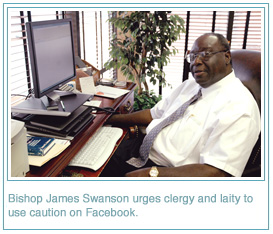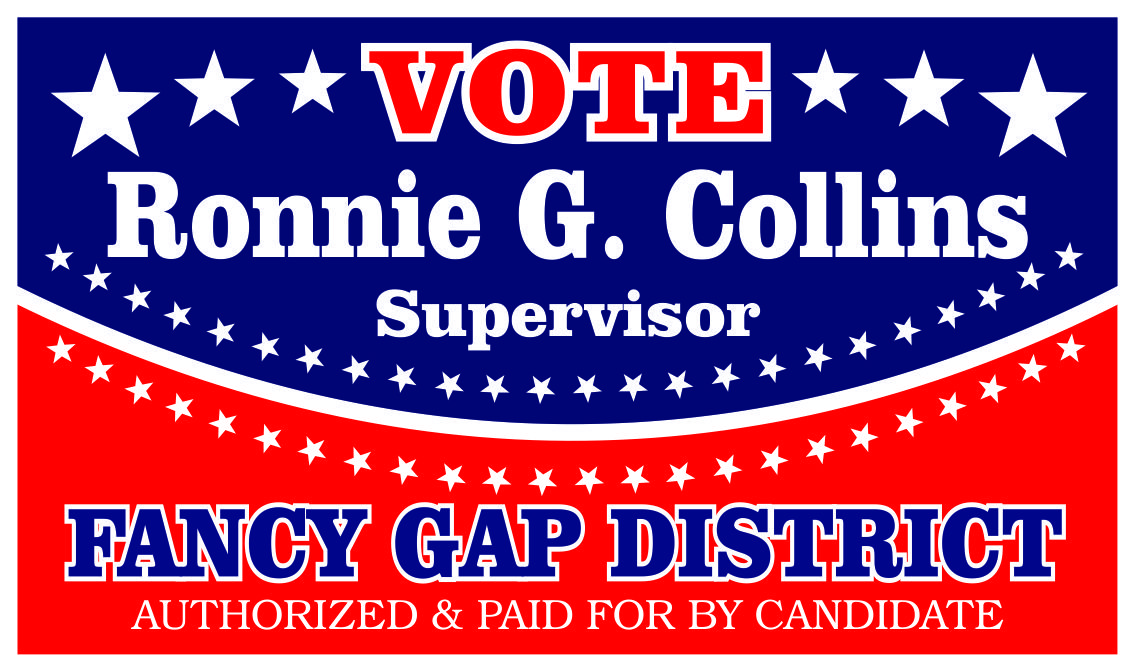Source: The Call 2
The Facebook social network has grown from 150 million users in January to 250 million this month, according to a July 22 Newsweek article. Hundreds of those users are United Methodists, who are discovering the Wesleyan potential of internet outreach. (“We have to go where the people are, and the people are online!” said one pastor in a recent Interpreter article.) The Call even established its own page this month.
Just as evident as the potential benefits, however, are the potential pitfalls. Last week in his Alcoa office, Bishop James Swanson, resident bishop of the Holston Conference and a Facebook user, spoke about some of his concerns.
THE CALL: You’ve already been on Facebook for several months. What inspired you to give it a try?
BISHOP SWANSON: Plain old vanity. Dan Taylor sent an e-mail saying that I was mentioned on Facebook. I didn’t realize you have to join to see what’s going on. So I just joined and found a page that was put up by the youth. The page was called “Bishop Swanson Makes Me Proud to be United Methodist.” I was flattered that young people would respond to an old preacher like myself. After I had already signed up, I just stayed on.
THE CALL: So Facebook seems like a good thing?
SWANSON: Oh yeah, it’s a neighborhood where people connect and talk to each other. I’ll give you a case in point. Last night I was on Facebook and happened to see that Jimmy Sherrod, who is one of our pastors, was online. I gave him a shout-out, and he reminded me that he is going to be the music leader for Sulphur Springs Camp Meeting. I said, “Yeah, that’s right. I look forward to seeing you there,” and asked if it would be helpful to know what I am going to preach. So we connected and I sent him the subjects of my sermons and the scriptures.
Another time, I was trying to find the cell phone number for one of our pastors, who is having a really tough bout with her health. Her daughter contacted me through Facebook, so I was able to reach her mother. Another pastor, Larry Trotter at Concord United Methodist Church, is using Facebook to connect with a whole community of young people. They do Bible studies and talk about when they’re going to fellowship. So I see that the benefits of Facebook can be tremendous. I just know that for pastors — they have to be very careful about how they use it.
THE CALL: Why do they have to be careful?
SWANSON: You have to be careful about what you’re posting, and also who you allow to be your Friend. Because some people are not as respectful of your confession of faith as you are. They might write messages on your Wall that you don’t want.
THE CALL: Yes, but you can remove the messages you don’t want.
SWANSON: Yes, you can remove them. But if you’re not an avid user, the message might be on there for three or four days before you realize it. I personally am not on Facebook everyday, but two to three times a week, maybe.
Another potential problem is that Facebook invites you to tell a lot about yourself. Sometimes, in our haste, we may reveal things that compromise our ability to effectively pastor our people.
THE CALL: What is an example of that?
SWANSON: Personal opinions or positions that don’t have to be public knowledge. Every congregation has some diversity – so diverse that it often shocks pastors when they find that out. You might think that everybody holds the same theological point of view, but they don’t. You could end up posting a viewpoint that people violently and vehemently disagree with – comments that are not important to your walk in Christ. Yet you can cause such a stink and a stir in the church that it can handicap your ability to minister to your people.
THE CALL: Only theological perspectives?
SWANSON: Theological, political, whatever. You just have to be careful about what you say and do. Case in point: I like to play cards. When I get with my wife’s family, we play a game called Bid Whist. I was in my third appointment, when I happened to mention in the pulpit that I like to play cards. Well, most people in the church thought that was fun. But some folk were really offended; they felt like a preacher shouldn’t play cards. It really hindered our relationship. I didn’t leave the church over it, but it really hindered my relationship with the people who were offended.
Now I do think a pastor has the right to have political views. They’re human beings. But Paul cautions us to be careful about what we say or do in order to minister to people. The Bible says to be as wise as a serpent, harmless as a dove. Sometimes even though you may feel very strongly about a viewpoint, it might not be wise to talk about it in public.
THE CALL: Have you seen examples of pastors who are not being careful on Facebook?
SWANSON: I have seen some things I did not like and things that did not need to be shared. I’m an old fogey about that. I believe that as a person called by Christ, I have to make some sacrifices for the good of the ministry. It’s like what Paul says: “If it offends my brother to eat meat, I’ll eat meat no longer.” He was speaking in the context of meat that had been offered up to idols during his day and time. Some Christians were offended by that. So Paul said: If it offends people and keeps them from hearing the Gospel, I just won’t do it.
When you’re real focused on your particular issues, sometimes you don’t think carefully about how that might affect somebody else’s faith. Sometimes you have to forgo what you want for the good of the whole. I’m not talking about justice issues. If your church is prejudiced about one group or another, the pastor needs to make a stand on that. You just have to weigh the issues before you spout off on Facebook or anywhere else. Ask yourself, “Is it worthwhile for me to say this, causing a firestorm in the church where God is using me to do some wonderful things?”
THE CALL: Are you speaking to clergy only, or to laity, too?
SWANSON: Both, if they’re in a position of trying to lead people to a life of transformation. Whether we like it or not, people have to believe in us before they will accept what we say. The truth is not always accepted just because it’s true. It has a lot to do with who says it and how you feel about that person. Even if I have something wonderful to offer – if they don’t personally like me — they’re not going to benefit. So what is more important: That I get to spout off about my opinion? Or that I chose my words wisely so I can lead people in a way that will bless them and bless their lives?
THE CALL: Is there anything else that we have to be careful of?
SWANSON: Yes, you can spend hours on the internet without even realizing it. So remember that the online community is not a real, live community. It is a place where you exchange information and you can somewhat get to know people. But you don’t really know people behind what they write, and you can get so wrapped up in using the internet that it becomes a reality. It can even foster an inappropriate relationship. It can cause all kinds of problems. Facebook is not a substitute for a real community.
THE CALL: So, with all that said, do you intend to keep using Facebook? And is it OK for Holston members to ask you to be their “Friends”?
SWANSON: Yeah, they can look for me on there. I intend to keep using it, but I keep intending to be careful of who I allow to be my Friend. Here’s an example. I have a young relative who I love, but she’s not as disciplined as I want her to be. She sent me an invitation to be her “Friend.” I looked at her page, and I didn’t like what was on there. She was kind of hurt. But I’m a bishop in The United Methodist Church, and there are things that should not be connected to my page. If you put a video on my page of you and your buddies out drinking – it might seem harmless to you — but my young adults might see that I somehow condone that behavior.
This is about putting my relationship with Christ as paramount to everything and anything I do, even to my friends. I take my calling and what I do very seriously. I don’t want to do anything to hurt the church, I just don’t. These 900 churches in Holston Conference — and the people in them — are so important. I have to make sure that my life and what I do doesn’t reflect in a way that would make somebody walk away from the church.



I thought Bishop Swanson made some great comments, don’t you? Thanks for putting them on your blog.
I have had the opportunity to be with the Bishop on a couple of occasions and hear his likes and dis-likes of facebook. Caution is always a good route to take with media of any kind.Thank you for reading.
Bishop Swanson, I just wanted to tell you again what a Powerful, Annointed, Spirit Filled sermon the LORD JESUS brought through you yesterday morning at East Stone Gap United Methodist Church. I’ve been telling everybody about it and yes, I even put it on Facebook in ‘BOLD PRINT’. GOD BLESS YOU FOR COMMING AND BRINGING US THIS WORD.
JESUS IS LORD!!!!!!!!
As I said to you yesterday, I’m SO PROUD that you are our Bishop!! GOD BLESS YOU AND YOUR FAMILY AND ALL YOU LAY YOUR HAND TO~IN THE MIGHTY NAME OF JESUS! AMEN & AMEN